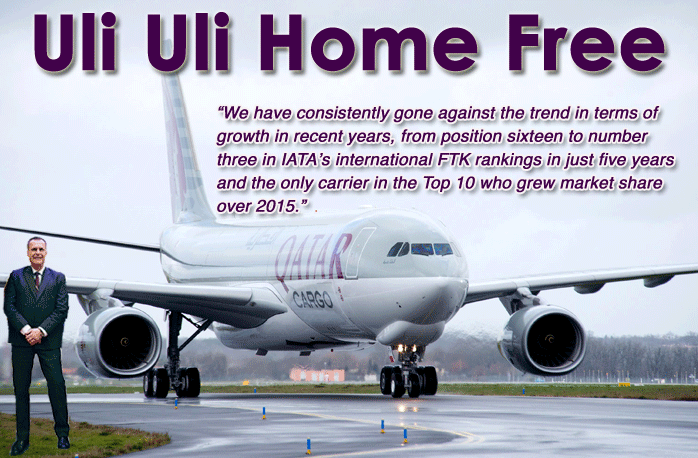
What
happens when a well-seasoned, former head of Cargolux
and one-time champion President of The International
Cargo Association (TIACA) leverages his great leadership
skills for the betterment of air cargo?
In this tale, that
person lands the job of a lifetime, which is exactly
what happened when Mr. Ulrich Ogiermann took
the reigns as Chief Officer Cargo of Qatar Airways
a few years ago.
Since then, the always
understated and somewhat self-effacing Uli has been
mostly out of the news as his charge, Qatar Cargo,
has steadily moved to the top rankings in the airline
business.
Could things be any
better for this German-born renaissance cargo man?
There is no sign
from Doha of a let up, either, as 2017 rolls along.
The airline cargo
resource with the image of a gazelle emblazoned
on its aircraft tails is jumping to new heights.
“No doubt,”
Uli said, “2016 is another year of record
growth for Qatar Airways Cargo, thanks to our customers
for their continuous support and business.
“Having received
three B777 freighters and launched six new freighter
services into the U.S., Canada, Europe, and Asia
last year, we remain the largest scheduled fleet
of freighters in the industry.”
Qatar
Cargo Trending
“We have consistently gone against the trend
in terms of growth in recent years, from position
sixteen to number three in IATA’s international
FTK rankings in just five years and the only carrier
in the Top 10 who grew market share over 2015.”
Qatar
Charter
“Today, our fleet includes eight Airbus 330,
eleven Boeing 777 freighters, and two Boeing 747-400
freighters.
“Our expanding
fleet count makes us a real charter player.
“It may seem
a tough environment in the industry at the moment,
but with our strategic planning in network and freighter
deployment, it will be a turning point for the market
with Q4 signalling better things to come.”
Expanson
Ahead In 2017
“Network and fleet expansion remains our key
focus this year.
“The airline
has recently made the announcement of 15 new passenger
gateways for 2017-18, in tandem with the extensive
deliveries of A350, B777, and A380 passenger aircraft.
“On the freighter
front, we will be receiving two B777 freighters
in 2017, taking our total fleet count to twenty-three.
“We anticipate
a significant upsurge in both bellyhold and freighter
capacity in months to come.”
New
Destinations
“We will soon be launching three new freighter
destinations into Latin America, i.e. Sao Paulo,
Buenos Aires, and Quito; and further expand our
freighter network in the United States with the
addition of Miami (Florida).
“The launch
of this new freighter route next month in February
2017 entails great business and network growth for
the cargo carrier as it brings the cargo carrier’s
total freighter destinations in the Americas to
12 while offering belly-hold services to 13 cities
on the continent.
“Customer-first
and service excellence is key to our sustainable
growth.
“We will continue
to focus on a successive launch and enhancement
of our new products such as QR Mail, addressing
the burgeoning e-commerce segment, and QR Express,
offering industry-leading rapid delivery for time-critical
shipments.”
We
Can Work It Out
“To match our growing capacity with the quality
of our products and services, we will continue to
work with our key stakeholders, such as IATA, and
regulatory authorities to ensure dedicated compliance
and adoption of advanced business processes, technology,
and operation procedures.
“Our aim is
to uphold our top three position on IATA’s
Cargo iQ quality ranking.”
The
Climate Is Right
“Investing in the future, we are developing
an advanced Climate Control Centre in response to
growing global demand in specialized air freight
solutions for temperature-sensitive products,”
Uli said.
“Our new 2,471-square
meter facility is expected to be commissioned in
early 2017.
“We will also
activate an industry-leading temperature-controlled
ramp handling system, including temperature and
location visibility on ramp.
“The industry
is moving towards e-air waybill, the electronic
interaction and booking system. Qatar Airways Cargo
will continue to invest and enhance in IT infrastructure,
enhancing our customer experience strategy.
“We are pleased to observe the growing user
base on our recently launched Online Services, which
offers e-bookings and other online activities. The
system is powered by CROAMIS, our world-class in-house
system that digitalizes end-to-end cargo processes.”
Qatar
Loves Forwarders
“We do not seek to disintermediate the freight
forwarders in the supply chain,” Uli declared,
“but rather we do look for opportunities to
get closer to them and their clients where we can
add value by making strategic network developments
as well as quality product and service offerings.
“A good example
is our constant investment in creating and expanding
our QR Pharma express services for high-demand routes
i.e. Brussels, Basel, Mumbai, Ahmedabad, and Hyderabad,”
he said.
Employees
& Customers
“Our customer proposition is a simple one
that we place at the very heart of our business,”
Uli said.
“We call it
‘The 3 Rs,’ i.e. rates, reliability,
and relationship.
“Every Qatar
Airways Cargo employee must focus on contributing
to these strategic pillars, corresponding to their
areas of responsibilities, roles, and expertise.
“We remain
highly supportive and creative when providing our
customers with specialized air freight solutions
to meet their needs.
“It is imperative
for us to build trust and long-term business relationships
with our customers through our sincerity and commitments
as their preferred service provider.”
How
We Improve Coming In Second
“Staying ahead of competition, we emphasize
achieving consistency of handling in terms of safety,
security, quality, and operational delivery across
the globe.
“This is not
an easy task, yet we set high standards for these
disciplines.
“With the new
(second) cargo terminal underway, it underlines
our commitment to not only enhance our capacity,
capability, and efficiency, but more importantly,
to perfect our customer service and best-in-class
air freight products,” Uli concluded.
Change
For The Better
“In my view, revenue uncertainty continues
to be the biggest challenge for the industry.
“During the
past two years the air cargo sector has seen further
declines in yield, but at the same time shippers
continue to protest about cost, poor levels of information
technology, and reliability, while asset owners
grumble about commoditization and eroding margins.
“This, coupled
with the fragmented nature of the supply chain results
in a two-class system: winners and losers.
“And it is
increasingly difficult to predict which camp one
will fall into at any given moment in time.
“As an industry,
we are old-fashioned and slow to adopt practices
to deal with these issues that comparable markets
embraced a long time ago.
“We must find
faster, more accurate ways to complete the deal-making
between the demand and supply side of air cargo.
“Spot rates
negotiated over telephone calls should already be
a thing of the past.
“And before
we congratulate ourselves for the growth in online
bookings, let’s face up to the reality that
often these are just a façade masking the
same old processes.
“Instead we
must fix the issues upstream by embracing big data,
analytics, and forecasting, using modern tools to
drive better pricing decisions, and we must be prepared
to seal those deals with more than just a handshake.
“Risk-taking
must be formalized, managed, and transacted through
fully automated distribution methods.
“Everyone else
is doing it.
“It is time
for air cargo to catch up with the 21st century,”
said Uli Ogiermann.
Geoffrey |




 Vol.
15 No. 95
Vol.
15 No. 95 Vol.
16 No. 1
Vol.
16 No. 1